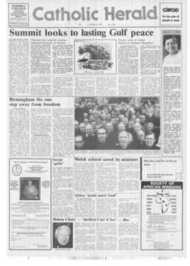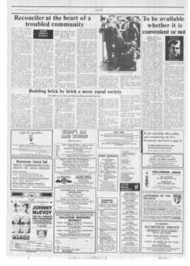Page 7, 1st March 1991
Page 7

Report an error
Noticed an error on this page?If you've noticed an error in this article please click here to report it.
Tags
Share
Related articles
Iiime=11
From W.h Auden To Al Pacino
Sir Arnold Lunn Replies To Elizabeth Jennings
Words Born Out Of Chaos H People Used To Mistake Her
Age Of Assurance
Not a-verse to conviction
Me and my God
Poet Elizabeth Jennings talks about her life and faith to Paul Goodman
TWO minutes before our deadline, I was seized by irrational and unaccountable fear. Perhaps when Elizabeth Jennings, Christian poet and writer, had told me that we
would meet in the entrance of Oxford's Randolph Hotel, she had actually meant outside the entrance.
Startled, 1 bolted for the door, and was on the verge of passing through it a tensely poised middle aged lady, who would have been a most unsuitable subject of inquiry, was pacing the street as if for a rendez-vous when, precisely on time, the poet herself shuffled into sight, in one of the many forms of distinctive poetical garb unbuttoned duffle-coat, bobbled hat pulled tightly over the forehead, knee length black-and-white hooped socks, and a flapping canvas bag worn across her chest like a reversed papoose.
She seemed, inspiringly, to be dressed for the delivery of an open-air peace poem.
This turned out to be far from the case. I had travelled to
Oxford, home of lost causes and Inspector Morse, to ask her about the dwindling away of identifiably Christian poetry; the pages of her own Collected Poems are festooned with religious. titles "Harvest and
Consecration", "Lazarus", "To a friend with a religious vocation".
As we re-entered the Randolph, she mulled over the question. "Isn't it the times, surely?" she said, before suddenly striking out. "In a way there's a great deal of luck sometimes . . . I think it's very difficult writing about God
unless it's God as man. But I do think that many of the greatest poets of this century have been Christian Eliot, Auden, David Jones. He will" she added breezily "always be difficult, won't he?"
Elizabeth Jennings, I think, is less difficult. Some poets like Eliot, whom she cited create their own imaginative world. Others like Auden, to requote her are more adept at writing of the domestic, of suffusing the everyday incident, the commonplace, with poetry.
"I write best when I'm happy," she told me, and remarked that she began writing poetry at the age of 13. "A very young 13," she emphasised, tugging at that canvas bag.
"You see, I was really about ten. or I I because I was a late developer. I could say some harsh things about my schooling, but" she said, considering "I won't".
Born in Boston (Lincolnshire, not Massachusetts), she moved to Oxford at the age of six, and has lived much of her life there since. "From then until when 1 was ten I simply believed that I was stupid."
It was encountering poetry during her teens that proved her wrong. (She was also prone to the inchoate religious doubts of adolescence "it got to the. point where I was doubting my own existence".) Stumbling across an anthology, she was bitten by the poetry bug; its teeth, to this day, have lost none of their sharpness. "I quite liked Walter De La Marc . . . it just hit me. I was fascinated by poetry from then on."
In 1955, she won the Somerset Maugham Award worth E400, not an insignificant sum in those days and de-camped to Italy. The journey had a marked effect upon her. "In a way it proved to be a discovery of religion, and in many senses it was the most intensely happy period of my life." She mused. "It made my religion happy, which it hadn't been before."
In her poem "Letter from Assisi", she evokes the light and shade of Italy, writing of doves and hills, of bells winding the air and days strung with silences. The experience may have been an escape from the rather more rigid Catholicism of her childhood. "In a way, you know, it was strict," she reminisced. "But I was perfectly happy until the age of six, when I made my first confession." Like the confessor, I am sworn to silence.
She is a deep mine of shrewd poetic opinion and personal , recollection. ("Did you know Philip Larkin?" she asked me, disturbingly). I found myself thinking of the poet who first inspired her, Walter De La Mare, and remembering a monk who once quoted his poem "The Listeners" (I think) to me. Indeed, that is almost all I do remember, with the exception of the last line "I kept my word, he said."
I rather think that, like him, Elizabeth Jennings has kept faith with her own poetic convictions.
blog comments powered by Disqus











